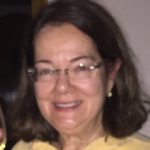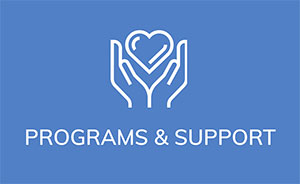
As you might have read on the CLL Society website recently, they are working diligently to put together support group opportunities across the country for those of us living with Chronic Lymphocytic Leukemia (CLL) . After six years of involvement with a support group that has a focus on blood cancers, I was asked to provide a personal perspective on how meaningful I have found the support group experience to be.
I was diagnosed with CLL on June 30, 2009 and shortly thereafter I would become the patient of an exceptional hematologist oncologist, Dr. Jose Azar, at the Indiana University Health Simon Cancer Center, in Indianapolis, Indiana. In early 2010 Dr. Azar, would ask me if I would assist him to bring a group into existence that would serve to support individuals with indolent, or slow growing, blood cancers. This group would include CLL patients.
As a young doctor, Dr. Azar had just recently completed his CLL fellowship and had a certain CLL patient newly assigned to his care. In a short period of time, this patient would pass away from what had been a lengthy and very brutal battle with CLL. On his deathbed he made his wife and Dr. Azar promise to follow through on his request to have a group created that would help patients have contact and support with others who were struggling with the same physical, mental and emotional issues that he and his wife had dealt with in their extended CLL journey.
In addition, there was to be support for the family and friends who care, support and love these patients through their ordeal. Dr. Azar had been touched by the lack of support for these needy individuals and committed himself to honoring this request. He wished me to serve as the facilitator representing patients and the caregiver perspective would be facilitated by the wife of the gentleman who had passed away. This was to be a new offering at the Cancer Center.
I would accept this request, never knowing the extent to which it would change and enrich my life with cancer. Mid-year 2010 the group was launched. As the last six years have progressed we have become a thriving group with a core of patients and caregivers predominantly living with CLL and Follicular lymphoma. Through the group I believe that many of us have found ways to better the life that fate has dealt us.
Support groups have varying structures and might incorporate some or all of the opportunities I describe below. In our case, at the Simon Cancer Center, there are many professional people who are vested in support groups and place great faith in the difference they have seen them make. Our group has had the same social worker participate for more than three years. She started with us as a student volunteer, was hired later by the hospital and to this day makes an enormous difference in providing an umbrella of understanding that can direct patients and caregivers to additional resources and provide sage professional opinion and suggestions. Wonderful oncology nurses attend our meetings to guarantee that exchanges of information on a variety of medical matters and on the subject of treatment are both appropriate and medically accurate.
In our group there is a lot of discussion on the importance of empathy and how hard it is to envision each other’s worlds between patient, caregiver, doctor, friend, child and parent. It is a continuous theme to clarify our view into the world of those most important to us and their view into ours as cancer patients. I think a witness to the program’s success is when, at the end of meetings, attendees are staying for extra time to share, care and inform. As one meeting recently concluded a participant said, “This is my other family”.
We have shared together difficult changes in members health and helped them to think through strategies to become more informed in facing inevitable decisions, in coping emotionally, in communicating with their doctors, in seeking other opinions or in looking for clinical trials. Members have made hospital visits, driven hours taking fellow patients to places where unique clinical trials were offered and scribed notes in appointments with doctors as a “second set of ears”.
We have seen the fear in the eyes of newly diagnosed patients. We try to help them to understand that many of us have been living for years and years with CLL and coach them in how to move on in their lives. A doctor can tell a patient this, but we serve as the living proof for the newly-diagnosed that there is life with cancer. Sometimes these new patients pass through a series of meetings with us and then disappear, because they are fortunate and they might have favorable genetics, some fears have been put to rest, they do not have to treat yet and they don’t want to think about their cancer. But we know they possibly could be back, and have seen them come back sometimes years later, if their symptoms progress and they need emotional support, treatment perspective, a safety net, and a place to voice their needs. As a group, we have seen a few deaths that opened our eyes to our own mortality and brought perspective on how to best live our lives with the time we have been given.
Once a year our meetings are be attended by Dr. Azar. This is usually following his review of, or attendance at, national conferences like the American Society of Hematologists (ASH) at which the latest in scientific advancements and new therapies for blood cancers are presented. He will share his perspectives on the latest information with the group and share in a question and answer period.
We, as well as other support groups, receive assistance from the Leukemia and Lymphoma Society (LLS) staff speaking on various topics and making use of their valuable resources. Other resources have been oncology dietitians, psychiatrists, chaplains and even a university professor who teaches medical students how to communicate and empathize with patients – and this helped us understand how we, in turn, can better communicate with the medical professionals in our lives.
In conclusion, a support group can be a wonderful gift a patient and caregivers give to themselves that has far-reaching effects. It is an outlet for positioning your life, with a long term cancer, with the experiences of others who can best relate. Should the opportunity or need ever arise for you to be a part of a CLL Support Group, I cannot encourage you enough to take a step in that direction. It could be a blessing you might never have anticipated and could help to make your journey more meaningful than you thought possible.
Teresa Altemeyer was diagnosed with CLL in 2009. She began treatment in an ACP-196 phase 1 trial as a chemo-naive patient in 2014. Shortly after her diagnosis in 2009 she was asked by her CLL specialist to facilitate a support group in Indianapolis, Indiana. As a result of this involvement, she came to embrace the role of patient advocate. She continues in her volunteer role with the support group and she serves on the board of the Indiana Leukemia and Lymphoma Society. To support our cause she has traveled to Washington, DC several times to meet with legislators and regularly attends national conferences to keep current with the latest CLL happenings. She just became a grandmother and looks forward to years of joy in this new role.
Originally published in The CLL Tribune Q1 2016.

















